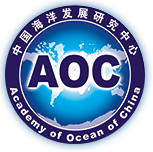Editor's note:The Academy of Ocean of China and theShanghai Academy of Social Sciences recently held a joint forum on maritimestrategy. Following are excerpts from the presentations made by five scholarsat the forum.
This article is first published in China Daily on May 22, 2018.

Jin Yongming, a researcher at the Institute of Law of Shanghai, Academy of Social Sciences, and deputy
head of Shanghai Association for Japanese Studies
Maritime rules have to be improved
China should play a leading role inreshaping the world maritime order and, based on this, expeditiously builditself into a strong maritime country, in order to boost its socialistmodernization drive with Chinese characteristics across the seas.
The report of the 19th National Congressof the Communist Party of China in October says that in the process of becominga strong maritime country, China should make the promotion of the Belt and RoadInitiative a key task, because it aims to build a community of shared futurefor humankind based on the principles of consultation, co-building andsharing and help develop a new type of international relations.
China should also make clear that thenew type of international relations would be developed on the basis of a new nationalsecurity and development perspective, so as to realize the goals ofcooperation, common development and win-win results. Such diplomatic principlesconstitute China's basic maritime governance philosophy, which can facilitatethe realization of its strong maritime country strategy.
The world's current maritime laws arethe result of a compromise between cooperation and confrontation in theinternational community and thus are ambiguous besides having inherentlimitations. And given their limitations on the jurisdiction claims of littoralstates and the general contention of rights by other countries, such as freedomof navigation and flight, and its perceptive and technical limitations on suchnew issues as the genetic sources of marine biodiversity, the extant maritimelaws need to be changed in a bid to better promote human development.
In fact, there are already calls torestrict the freedom of navigation in the high seas and strengthen the role ofinternational agencies to conduct comprehensive maritime management. Whetherthese ideas and claims will be recognized by the international community andincorporated into the maritime laws remains to be seen.
Against this backdrop, China shouldtransform its role and orientation to help reshape the world maritime order, bymaking it more comprehensive, and playing a leading role in maintaining the neworder and creating an environment favorable to the realization of its strongmaritime country strategy. For example, China should transform its role from anobserver, maintainer and executor of maritime rules to a maker, maintainer andsupervisor of the new rules.
By being clear about its role and aims,China can help transform the maritime rules to promote comprehensive seamanagement and realize sustainable and integrated human-marine development. Assuch, China should adhere to the integrated land-sea development principle, andexpedite the implementation of its strong maritime country strategy to helpimprove the prevailing maritime system on a bilateral, regional andmultilateral basis.

Feng Liang, deputydirector of Collaborative Innovation Center of South China Sea Studies atNanjing Universit
Better safeguardrising overseas interests
China's efforts to become a strongmaritime country, as mapped out by the report of the 19th National Congress ofthe CPC, are an important part of the country's strategy to achieve nationalrejuvenation. However, during this process, China will have great opportunitiesas well as face huge challenges. Therefore, China has to be prepared toovercome crises, by strengthening top-level design and comprehensive strategicarrangements to better protect its maritime rights and interests, and advanceinternational cooperation.
China, at present, faces three majorchallenges when it comes to maintaining its overseas rights and interests.First, China could encounter a severe challenge from the possiblemisunderstandings, obstructions and conflicts in the countries involved in theBelt and Road Initiative given the different political systems, religions,cultures and laws and regulations, and/or lingering turbulence in thosecountries.
Second, China could face obstructionsfrom the West, as reflected by the newly launched Indo-Pacificstrategy by the United States, the hyping up of the China threattheory once again by some Western countries, and the restrictions on Chineseinvestment imposed by the European Union and some other Western economies. Theypose potential risks to China in the process of its expanding overseasinterests.
And third, China faces the challenge ofbuilding its capability and means to such an extent that it can maintain itsoverseas interests, which now extend across the world.
Looking into the future, China shouldhave clearer goals and means to maintain its overseas interests, such as takingmore concrete measures to implement its consultation, co-building andsharing proposals. It also should accelerate the process of developinginto a strong maritime country, strengthen its planning and execution onmaritime issues, and set up a more agile and responsive maritime interestcoordinating mechanism.

Wu Shicun, presidentof the National Institute for South China Sea Studies
Nation can better respond to a crisis
Last year, the US conducted fourfreedom of navigation operations in the South China Sea, and itsvessels frequently visited the military bases of some of China's neighbors.China can better respond to such US actions (as well as the US military'spresence in the region) now that it has built essential strategic facilities onsome islands and reefs in the South China Sea and further strengthened itsmilitary. These factors could greatly influence the situation in the SouthChina Sea.
Japan and Australia, the two importantallies of the US in the Asia-Pacific, have tried to interfere in the SouthChina Sea issue, and their involvement will add a new variable to thesituation. For instance, in mid-2017, Japan's Maritime Self-Defense Forceorganized its first large-scale and months-long navigation in the South ChinaSea, and its vessels visited the ports of Vietnam and the Philippines. It alsotook part in the military drill held by the US and India in the Indian Ocean.These actions were aimed at extending Japan's naval reach beyondthe South China Sea. Australia has taken similar actions, with itsAsia-stationed frigates recently calling on the ports of Vietnam, thePhilippines and Malaysia. This means Australia is also trying to extend itsnaval arm to the South China Sea.
As the US and its allies conductincreasingly frequent and diverse freedom of navigation operationsin the South China Sea, China is expected to take more diverse and tougherresponse measures to protect its sovereign maritime claims. And since not muchprogress could be made in the past talks on a code of conduct in the SouthChina Sea among the relevant parties, the sources of maritime disputes andfrictions still exist. So far, no consensus has been reached on such issues aswhether the code should be legally binding, whether it is a crisis settlementmechanism or a crisis control mechanism, or what kinds of maritime disputessuch a consensus should be applied to.
Considering the code of conduct in theSouth China Sea under negotiation also involves who will benefit most from themaking of the rules, China should take the initiative to maintain its presencein this arduous game, in which not only littoral but also some non-littoralstates around the South China Sea hope to claim interest.

Zheng Hailin, director of Hong KongInstitute of Asia-Pacific Studies
Building a social system based on yuanstandard
The US' political and economic successafter the end of World War II mainly lies in its powerful navy, the post-warglobal security system, a US dollar-centered global financial system, and avalue system built on freedom, democracy and human rights.
But the US' excessive use of force andunilateral expansionism across the world in recent years have resulted inpeople gradually losing trust in the US-style of social and value system. TheUS is also facing major challenges that it cannot overcome alone-the conflict between Islam andChristianity, the severe challenge to the dollar standard, and the challenge tothe US-proclaimed value system.
Is China's rise on the same lines as theUS'? China, to be sure, has chosen the correct development road. At present,China's systematic design strives to strike the right balance betweenefficiency and fairness because they help raise productivity of the wholecountry.
And the fact that only China canefficiently mobilize the maximum resources to complete a big task is a reflectionof the superiority of the socialist system. In addition, if China promotes anorganic combination of universal value and traditional Chinese culture whiletrying to establish a common value system widely acceptable to theinternational community, its civilization and culture will forever remainstrong.
China has put forward two goals-the building of a community of sharedfuture for humankind and the Belt and Road Initiative. If the BritishCommonwealth system was built on the gold standard, and the postwarUS society is built on the dollar standard, China should build ayuan-standard-based social system. Currently, China's national strengthcontinues to rise and the yuan remains strong and popular across the world. SoChina should try to establish a yuan-standard-based social system and become astrong maritime country.

Liu Huirong, dean of the Law and PoliticsSchool, Ocean University of China
Active participant in the polar affairs
The rapid development of science andtechnology, and the expansion of human activities in space have alreadyextended exploration, research and exploitation from land and coastal areas tothe high seas and oceans, the polar regions, outer space and cyberspace. Outerspace and cyberspace are called the new global territories, and the polarregions and high seas the new sea territories.
The new sea territories have become anew area where various countries are trying to expand their strategic resourcesand pursue superiority, turning them into a new power game arena ofinternational relations. According to extant international laws, most of thesenew territories are assets of humankind, and thus countries can conductcompetitive but not exclusive activities there. The question is: How to takeaccount of the interests of all the stakeholders while safeguarding the commoninterests of humankind?
Some countries' maritime activities,such as marine research, tourism, transportation, fishing, exploration anddevelopment of deep-sea minerals and carbon sequestration, pose potentialenvironmental risks. So the relevant international agencies and industrialassociations should consider issuing permits for conducting such activities by,for example, formulating relevant conventions and accords. China, as an activeparticipant in these activities, has already made major contributions to theexisting conventions and accords.
In January, China published a whitepaper on its Arctic policy, saying the country is one of the importantstakeholders in the Arctic. The goal of its policy is to protect and utilizethe resources in the Arctic, participate in the region's governance, andsafeguard the common interests of all states and the international community,as well as promote sustainable development in the region.
As far as Antarctica is concerned, Chinainked the Antarctic Treaty in 1983 and was unanimously acknowledged as aconsultative party at the Antarctic Treaty Consultative Meeting in 1985.Antarctica is an area of frozen sovereignty, and of the 29 consultative states,only China, India, Ecuador and Poland have not formulated their Antarcticlegislation. Once China formulates such legislation, it can better protect itsinterests in the Antarctic and take an important step toward boosting itsstatus as an important consultative party to the Antarctic Treaty.
Source:China Daily




